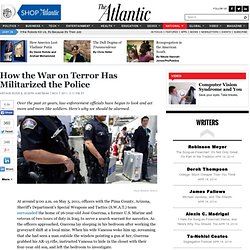

Cops With Machine Guns: How the War on Terror Has Militarized the Police - Arthur Rizer and Joseph Hartman - National. Over the past 10 years, law enforcement officials have begun to look and act more and more like soldiers.

Here's why we should be alarmed. Danny Moloshok / Reuters At around 9:00 a.m. on May 5, 2011, officers with the Pima County, Arizona, Sheriff's Department's Special Weapons and Tactics (S.W.A.T.) team surrounded the home of 26-year-old José Guerena, a former U.S. Marine and veteran of two tours of duty in Iraq, to serve a search warrant for narcotics.
As the officers approached, Guerena lay sleeping in his bedroom after working the graveyard shift at a local mine. Within moments, and without Guerena firing a shot--or even switching his rifle off of "safety"--he lay dying, his body riddled with 60 bullets. Sadly, the Guerenas are not alone; in recent years we have witnessed a proliferation in incidents of excessive, military-style force by police S.W.A.T. teams, which often make national headlines due to their sheer brutality. Future of online news. North Korean profs to study at UBC. A new program designed to promote engagement between Canada and North Korea will be bringing six professors from North Korea to study English and economics at UBC for six months. “It’s a very tentative program. It’s the first time it’s been done. We’re not sure where it’s going. Even at the very worst, we’re going to learn things.
There doesn’t seem to be any downside to it,” said Stephen Owen, who is VP external, legal and community relations for UBC. “It might turn out to be a very positive thing, it might be a bust and something that isn’t continued. The program, which is called the Democratic People’s Republic of Korea Knowledge Partnership Program, is directed by Kyung-Ae Park, the director of UBC’s Centre for Korean Research. The names of the professors have not been released, but they are experts in their respective fields of macroeconomics, taxation, international trade and finance at Kim Il Sung University and Jong Jun Taek Economics University. 'Leak risk after explosion at French nuclear plant' 12 September 2011Last updated at 17:42 One person was seriously injured in the explosion, reportedly suffering from burns One person has been killed and four injured, one seriously, in a blast at the Marcoule nuclear site in France.

There was no risk of a radioactive leak after the blast, caused by a fire near a furnace in the Centraco radioactive waste storage site, said officials. The owner of the southern French plant, national electricity provider EDF, said it had been "an industrial accident, not a nuclear accident". The cause of the blast was not yet known, said the company. The explosion hit the area at 11:45 local time (09:45 GMT). But interior ministry spokesman Pierre-Henry Brandet later said there had been no leak of radiation, neither inside nor outside the plant. None of the injured workers was contaminated by radiation, said officials. The Centraco treatment centre belongs to a subsidiary of EDF. Continue reading the main story Analysis Marcoule's long nuclear history Stress tests.